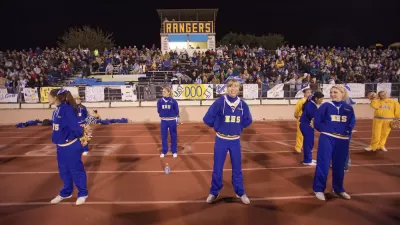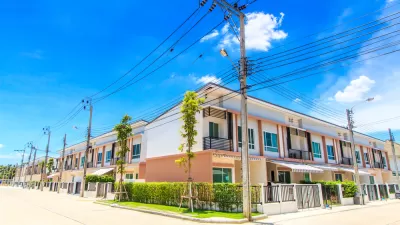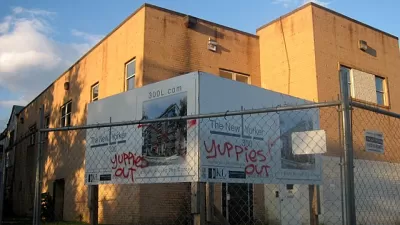Both supporters and opponents of the sprawl status quo often refer to suburbia as “The American Dream.” One sprawl-defending organization even calls itself “The American Dream Coalition.”
Both supporters and opponents of the sprawl status quo often refer to suburbia as "The American Dream." One sprawl-defending organization even calls itself "The American Dream Coalition". Sprawl critics use similar language; for example, in 1998, the Sierra Club issued a report titled "Sprawl: The Dark Side of the American Dream."
The equation of the "American Dream" with sprawl is inconsistent with the term's original meaning. The term "American Dream" was apparently invented in 1931 by historian James Truslow Adams; he was referring to "That dream of a land in which life should be better and richer and fuller for every man, with opportunity for each according to his ability or achievement." (Youngro Lee, To Dream Or Not To Dream, 16 Cornell Journal of Law and Public Policy 231, 232). Thus, the term "American Dream" means not one type of house on one type of lot, but an economy open to talent, whether in dense cities, streetcar suburbs, or small towns.
More importantly, the use of the term "American Dream" to describe just one type of development is so inconsistent with America's libertarian values as to be almost un-American.
In the Declaration of Independence, Thomas Jefferson wrote that people are "endowed by their creator with certain unalienable rights, that among these are life, liberty and the pursuit of happiness." To me, "liberty" implies some diversity of living arrangements - not just suburbs, but big cities and small, rural retreats and small towns. "Liberty" implies that Americans should be free to create Manhattan as well as Montana.
By contrast, the use of the term "American Dream" to describe the sprawl status quo implies that only one form of development is "American" - that large-lot suburbia, as the "American Dream", is what all real Americans want, and that cities and small towns and rural areas are for foreigners. There is nothing particularly libertarian about such an attitude.
Sprawl critics weaken their position by allowing their opponents to get away with such abuses of patriotism. Instead, supporters of more compact development should be reclaiming the mantle of Americanism themselves - for example, by suggesting that people are freer when they can walk as well as drive.

Alabama: Trump Terminates Settlements for Black Communities Harmed By Raw Sewage
Trump deemed the landmark civil rights agreement “illegal DEI and environmental justice policy.”

Planetizen Federal Action Tracker
A weekly monitor of how Trump’s orders and actions are impacting planners and planning in America.

The 120 Year Old Tiny Home Villages That Sheltered San Francisco’s Earthquake Refugees
More than a century ago, San Francisco mobilized to house thousands of residents displaced by the 1906 earthquake. Could their strategy offer a model for the present?

Ken Jennings Launches Transit Web Series
The Jeopardy champ wants you to ride public transit.

BLM To Rescind Public Lands Rule
The change will downgrade conservation, once again putting federal land at risk for mining and other extractive uses.

Indy Neighborhood Group Builds Temporary Multi-Use Path
Community members, aided in part by funding from the city, repurposed a vehicle lane to create a protected bike and pedestrian path for the summer season.
Urban Design for Planners 1: Software Tools
This six-course series explores essential urban design concepts using open source software and equips planners with the tools they need to participate fully in the urban design process.
Planning for Universal Design
Learn the tools for implementing Universal Design in planning regulations.
Clanton & Associates, Inc.
Jessamine County Fiscal Court
Institute for Housing and Urban Development Studies (IHS)
City of Grandview
Harvard GSD Executive Education
Toledo-Lucas County Plan Commissions
Salt Lake City
NYU Wagner Graduate School of Public Service






























